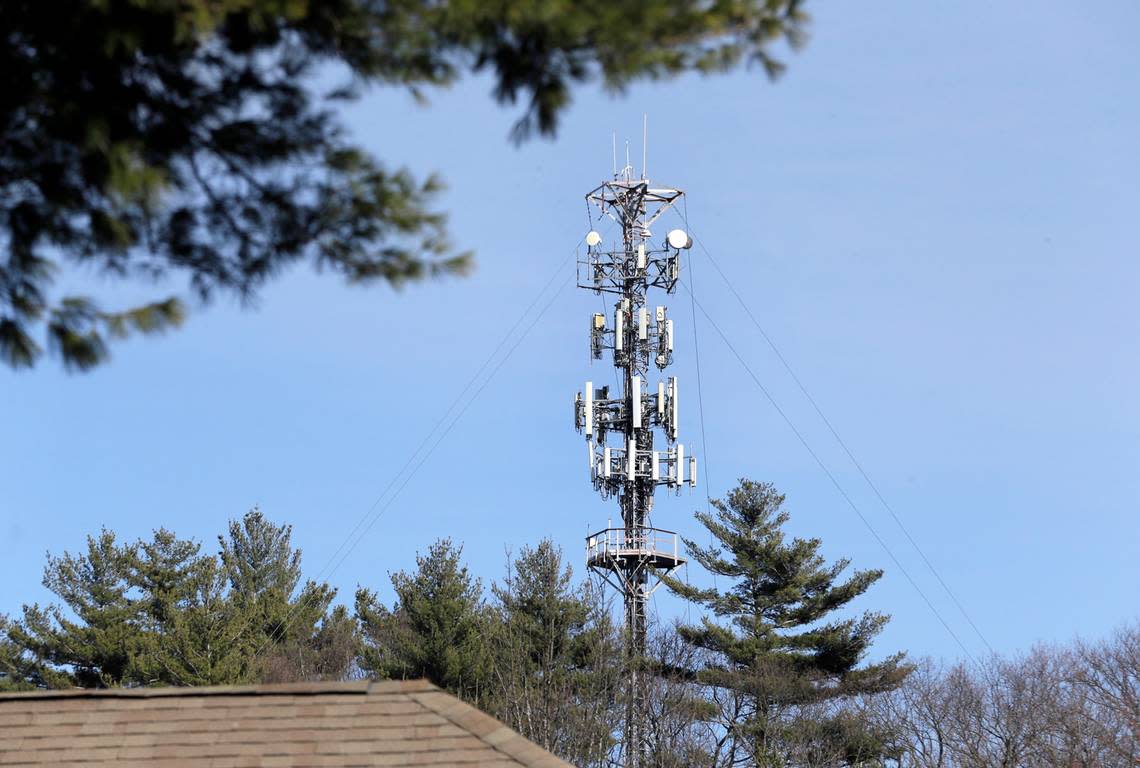‘Our hands are tied.’ Cell tower approved in Lexington neighborhood despite opposition
The Urban County Planning Commission approved an 125-foot tall cell tower in the Palomar area despite pleas from neighbors to turn down the request.
The commission voted 5-3 Thursday to approve the application by Municipal Communications III, LLC and Dish Network, LLC to put a monopole tower and associated ground equipment within a 60 foot by 60 foot fenced and landscaped compound at Palomar Baptist Church on the corner of Fort Harrods Drive and Man O’ War.
Palomar Baptist Church has had a lease with Municipal Communications and Dish Network for at least nine years. It wasn’t until this year Municipal Communications decided to build the tower on the property that is surrounded by apartments and homes.
David Pike, a lawyer for Municipal Communications and Dish Network, said Dish Network is a new, full-service communications provider. Dish Network has been able to co-locate on other cellular towers for 27 of its locations in Fayette County. The Palomar site is the only new construction site.
“There will be no service in this area without this structure,” Pike said.
Claims that cell towers are ugly cannot be considered by the planning commission, according to federal case law, Pike said.
Pike said Dish Network has also exhausted all other sites in the area, a factor the commission must consider with an application for a cell phone tower, he said.
The city’s planning staff recommended approval of the cell phone tower even though it’s close to a historic district. Local rules say cell phone towers can’t be located within 1,200 feet of a historic district. In this case, that’s Bowman Mill, a farm across Man O War, said Autumn Goderwis, a senior planner with the city.
Goderwis said the planning staff is recommending additional trees and hedges along the property to help shield it from the historic district.
Pike said the Bowman Mill historic district is exceptionally large.
“It’s one of the shortest towers you are going to have in your community and it’s unlit,” Pike said. Although 125 feet doesn’t sound short, “by cell phone towers, it is small.”

Questions about real estate values, sink holes
More than a half dozen residents spoke against the location of the cell phone tower on the church property. Some said it would lower property values. Others questioned if a Dish Network geological survey was properly completed. Others said smaller or mini cell towers were more appropriate for the area instead of a 125-feet tower.
Walt Gaffield, a neighbor, said Dish Network did not exhaust all possible sites in the area for a potential cell tower. It has had a lease with the church for years, he said.
Yanling Newman, a real estate agent who lives near the proposed tower, said several studies have shown cell phone towers lower property values and lead to decreased interest in potential property.
A National Institute for Science, Law and Public Policy survey showed 80% of respondents said they would not consider buying a property near a cell phone tower, Newman said.
Newman argued part of the comprehensive plan, which guides development in Fayette County, requires the commission to consider the negative effects a development would have on a neighborhood. Decreasing property values is a negative effect, she said.
“We have collected 300 signatures to reject the cell phone tower,” Newman said.
Pike countered a Dish Network real estate appraiser has found cell towers “will not adversely affect the value of real estate.”
Others argued Dish Network’s geotechnical report that showed there were no sink holes within a half mile of the cell tower was flawed. The geotechnical report is required for cell phone tower construction.
A Kentucky Geological Survey map showed multiple sink holes within a half-mile radius of the proposed tower, said Joyce Arvin, a nearby resident. One is less than a tenth of a mile from the church property, she said.
“This is incorrect or seriously flawed,” Arvin said of Dish Network’s geotechnical report.
Pike countered Dish’s geotechnical report included core samples at the location and did not show problems.
Paula Johnson owns two homes close to the proposed tower and urged the commission to turn down the request.
“It’s completely out of character with our residential neighborhoods,” Johnson said. “It significantly degrades” the neighborhood, she said.
Why health affects are not allowed to be discussed
As cell phone use has become ubiquitous, so have towers and the fights over where they are located.
According to city records, the last free-standing cell phone tower was approved in 2019 on Athens Boonesboro Road not far from Jacobson Park.
The location of cell phone towers are governed by federal, state and local ordinances.
The Federal Communications Commission, or FCC, has oversight of the telecommunications industry. In 1996, it said that state and local governments could not consider health and environmental affects to deny a cell phone tower, said Goderwis, a planner with the city’s planning department.
The Kentucky Public Service Commission also has oversight over cellular networks. Up until 2000, approval of cell phone towers was left to the commission. That year, a new regulation allowed local government’s planning commissions to have a say on where cell phone towers are located.
Several planning commission members said they were frustrated the patchwork of laws governing cell towers gave them little flexibility.
“Our hands are tied,” said Bruce Nicol, a commission member who voted to approve the tower.
